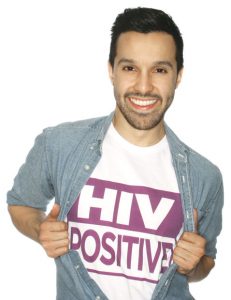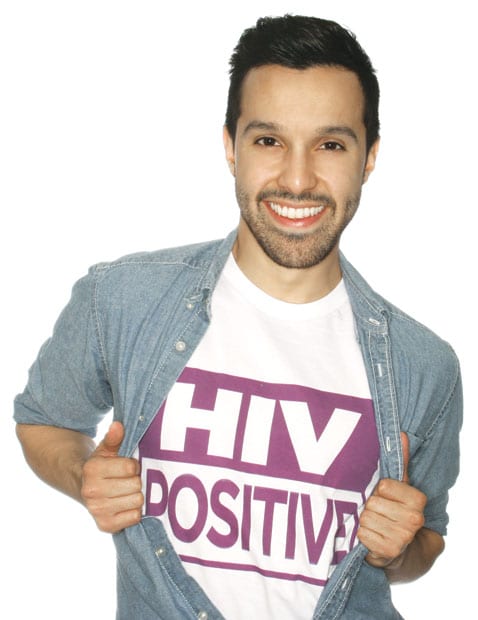As we select our LGBT Texan of the Year, we also want to acknowledge some of the local folks who helped define 2014 for us on the cultural side — people who often don’t get the recognition they deserve, those who made an impact on the discussion and those who simply made North Texan a more interesting place to live. Thanks!
The actor/singer turned his HIV diagnosis into a crusade for acceptance
ARNOLD WAYNE JONES | Executive Editor

GREATER THAN | Angel Velasco turned his HIV diagnosis into a campaign to remove the stigma of being positive. (Arnold Wayne Jones/Dallas Voice)
This year started out for Angel Velasco as a nightmare, but by the end, it felt like a dream.
It was the first week in January when Velasco, 26, learned that he was HIV-positive. The news hit him, as many can relate, like a thunderbolt.
But Velasco — an acclaimed actor and singer — is not the kind to let things stayed bottled up. He very quickly began sharing his status — first with family and close friends, then colleagues and finally the world.
In March, he heard about the opportunity to participate in a new ad campaign for HIV/AIDS awareness. “I applied online, but part of me thought, ‘I will never hear from them again,’” he recalls. “Then a minute later I thought, ‘Why wouldn’t they pick me?’ I had a shot.”
He did indeed have a shot. He was informed in April that he would be part of the Greater Than AIDS campaign (GreaterThan.org). There has already been one version, cast locally in San Francisco, but this new campaign was intended to target North Texas specifically, “because the number of cases is growing and they wanted to acknowledge that,” he says.
The ads garnered national attention, and print versions and videos (streamable on YouTube) became a large part of the discussion on HIV in 2014. For Velasco, though, the act of discussing his status “became like a second coming-out.”
“It has definitely been a surprise,” he says. “Leading up to the release of the campaign, I wasn’t thinking beyond being out there and telling my story. That was the hardest thing to prepare for. I was really anticipating everyone knowing. But my mom gave me the best advice about it. She said, ‘Inspire people to take care of themselves.’”
Many of the other ambassadors’ YouTube videos have from 5,000 to 10,000 views; as of last month, Velasco’s had more than 70,000. That brought a lot of attention on him.
Velasco quickly became an expert about HIV: How rates are growing among those 18 to 24; how HIV infections are a serious issue not just in the gay community, but the African-American community as well. And one study in particular resonated with him: The one that says 1 in 6 individuals who is HIV-positive doesn’t know it. And then there are the stigmas.
“We were discussing the topic of stigma at The White House,” Velasco offers, nonchalantly mentioning how the campaign got him a seat in D.C. at a discussion group about HIV that he describes as surreal. “[I was interested] in social acceptance specifically as it pertains to religion. A lot of what [causes shame] boils down to is religion. We want to spotlight churches that are helping” HIV-positive people without being judgmental, he says.
Approaching a discussion about HIV from a place of understanding has been the most important part of the process for Velasco — and coming to terms with his past biases.
“A lot of the discrimination [HIV-positive people] experience comes from within the gay community,” he says. Before, it never occurred to him that identifying himself as “DDF” (drug- and disease-free) was a negative; post diagnosis, he sees it otherwise.
“[The phrase] equates drug use to having a disease. People don’t discriminate against other people for having diabetes, and a lot of doctors compare HIV to diabetes, in that it is very manageable.” Even worse? Calling yourself “clean” as a synonym for being HIV-negative. “So many people use these terms that they don’t even know they are stigmatizing. Before I contracted HIV, I said plenty of things like that,” he admits.
It’s that feeling of shame — a kind of secondary closet — that has inspired much of Velasco’s mission in the past year.
“What I’ve really enjoyed doing is just talking to people. I’m trying to reach people who are positive and are having a hard time with it. When you are confident in your health your status, [a positive diagnosis] doesn’t have to change anything about who you are.”
Velasco is currently in the pre-planning stages of an online website for outreach, but plans to “take my time and make sure that everything is right. Beyond that, he hopes to make HIV awareness not just a passion, but a calling.
“I want to work in the HIV field and make it my day job,” he says. “Being positive doesn’t have to define who you are … though I am letting it define me, so other don’t.”
Watch the videos at GreaterThan.org.
This article appeared in the Dallas Voice print edition December 12, 2014


